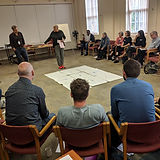A BRIEF HISTORY OF BRAP
We’ve been in the game a long time. In fact, 2019 is our 20th anniversary.
Here are some of our fave memories.
National recognition
2008
We pioneered human rights policies and strategies for a range of health commissioning organisations. These were showcased by the Department of Health as good practice.
Human rights in healthcare
2011
The government announces it will use the human rights standard we devised for Macmillan Cancer Support to help reducing cancer inequalities.
Uniting the city
2014
With Birmingham reeling from the Trojan Horse affair, we hold public events, talk with schools, and advise the city council. Thousands of people download our reports and guidance on the issue (which you can read here).
Truth to power
2017
The Prime Minister invited us to Downing Street to discuss the state of race equality in the UK. You can see what we said here.
Changing conversations
2018
Trialling new approaches to democratizing conversations, we hold events up and down the country to find out how people really feel about the way communities are changing. We engaged over 500 people and afterwards went to Sweden, Turkey, and Spain to tell them how we did it.
THE NAME GAME
We know what you’re thinking – “What does ‘brap’ stand for?”
Well, brap stands for equality, fairness, human rights, social justice, and better outcomes for service users.
It used to stand for ‘Birmingham Race Action Partnership’. The partnership was between a range of organisations, including the Learning & Skills Council, Birmingham local authority, Birmingham TUC and Connexions. They all came together in recognition of the need for some fresh, evidenced-based thinking on equalities issues.
That was in 1999. It soon became clear, though, that Birmingham Race Action Partnership was a slightly misleading name.
We realised a long time ago that tackling ‘race’ inequalities meant tackling all forms of inequality, so our work wasn’t just restricted to race. In addition, a lot of our work was national, not just local to Birmingham. And while the original partners still maintain a close interest in the organisation and have a role within the governance structure, it wasn’t entirely accurate to describe brap as a ‘partnership’.
In fact, by 2006, the only part of our name that accurately reflected what we did was ‘Action’.
So we decided to change it to ‘brap’. It’s how people knew us and what we stood for: fairness and human rights.















